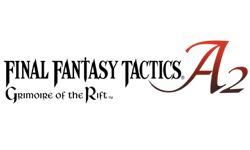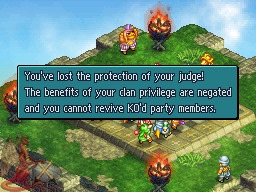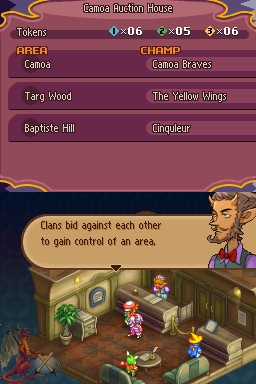|
|

|
PLATFORM
|
DS
|
BATTLE SYSTEM
|

|
INTERACTION
|

|
ORIGINALITY
|

|
STORY
|

|
MUSIC & SOUND
|

|
VISUALS
|

|
CHALLENGE
|
Moderate
|
COMPLETION TIME
|
60-80 Hours
|
|
OVERALL

|
+ Law System overhaul
+ Interesting characters
+ Good mission variety
- Badly paced story
- Recycled graphics/music
- Lack of title variety
|
Click here for scoring definitions
|
|
|
A delinquent boy does what any typical bratty kid doing library detention could do: writes his name in the first book he finds. That one signature transports him into the world of Ivalice, where books are the gate to a wonderful world of fantasy and unimaginable feats. Can a book really hold the key to an entire world? It appears so in Final Fantasy Tactics A2: Grimoire of the Rift, where belief is the strongest force in the universe. Though the game isn't perfect by any standards, it does manage to be a small cut above the rest with a much-improved battle system and a good, if harried, storyline.
The battle system is a much improved version of the original. It builds upon the first idea, adding new twists and fixing the biggest problems that drove many players away. There are no random battles; all combat comes from either missions or rarely from monsters clearly displayed on the map. Cities have pubs, which give out mission information for a small fee. All but main story jobs have time limits, so don't tarry too much to finish the job. There's a small variety of goals for the missions, with the predominant set being defeat all enemies, defeat one mark, and deliver an item.
Once combat has begun, it's typical tactical RPG with a flair. At the outset of the battle, a goal and the battle's law is declared. Who will enter the battlefield is chosen, and their jobs and equipment can be changed, and a clan privilege is chosen. Laws are static to each battle; if a player resets and re-enters the battle, the same law will be in place. The laws are generally contextual to the battle -- if the enemies are all casters, a law barring debuffs or missing (silence is notoriously fickle) may be in place. If the player holds the law, they receive a bonus at the end of the battle. If a law is broken, the clan loses their privilege and cannot revive KOed members. Most laws can be avoided simply by choosing the right set of job classes, and sometimes it's prudent simply to throw caution to the wind and break the law anyways. Beyond the laws, the combat system is very standard tactical fare with grid-based movement. Attacks are more effective when beside or behind the target, including magical attacks.
 Breaking the Law
Breaking the Law
|
|
The rewards for defeating opponents as well as completing quests are bazaar items. These combine together in a variety of recipes at a shop. Once the items have been entered into the bazaar in the right mixture (recipes will be light up on the list when the player has the correct ingredients), the player can then purchase the new armour and equipment. To learn new abilities, characters must equip pieces that teach their current job something new -- this idea has been seen before in several Final Fantasy games. Abilities from new equipment are usable immediately, but they must be mastered before being available for use when the equipment is replaced. Ability Points (AP) are rewarded as quests are completed; when the ability has been fully mastered, the game informs the player. Though only a core set of jobs are available from the outset, doing missions will reveal new jobs, but only by mastering abilities will each new job become available to a character. Not every race has access to all jobs, so it is wise to gather a team with a variety of races. Units not in battle do not gain experience, but always gain AP.
Outside of regular missions, there's also specific clan trials which can be undertaken. These jobs cost CP (clan points) which are also awarded for completing successful missions. If a player succeeds during these trials, their clan stats will increase: negotiation, aptitude, teamwork, adaptability. Some missions will require a minimum in one or more of these stats. Along with the boost in stats, these clan trials also bestow a title upon the clan, with mixed benefits -- the more prestigious titles reduce the cost of missions as well as items in the shop. These trials often have the most interesting variety of goals, and unlock clan privileges. One privilege is chosen at the start of combat and is lost if the law is broken. privileges include beefing up certain stats such as power or hit chance, or bestowing power on a certain race. If a player has the first FFTA game they may unlock at their leisure a special privilege which shows where traps are on the map, color coded to their effects. This privilege is also available in a trial if the player does not own the prequel.
Outside of combat, once per year there are auctions to see who will control the various areas on the map. Bidding is done via chips, and is learned by practical example over explanations. Most of the NPC opponents have tells, varying by what type of chip they're going to play. The clan which bets the most number of chips wins control, with up to four areas per region. If one clan ever claims all the areas in a region, they are declared champions of the region and their power cannot be taken away. Yearly auctions in these areas are instead for lucrative items which often teach rare abilities.
The music and visuals share one large flaw: recycling. While Final Fantasy games always borrow aspects from previous games, it feels like nearly everything in these two areas was taken from the GBA title. Though there's a few new tunes, and some new models, overwhelmingly the sounds and sights weren't touched. While this doesn't detract from the game per se, it seems a sloppy oversight and it does pull down the game to some extent. The interface is well done with no complaints and faint praise. Menus are easy to navigate and equipping party members in and out of shops is a breeze. Unfortunately, the "Optimized Equipment" option seems rather demented. The localization is done very well, with the main characters all having their own little personalities, including strengths and flaws. It's a surprisingly strong point in what's mostly an immature story, but the characters do have a nice shine to them, and the text is translated both with context and no visible flaws.
 Auction House
Auction House
|
|
With hundreds of missions available to complete, the game isn't lacking things to do. It could easily take a player over eighty hours to complete all the missions, but the typical player should have no problem completing the main storyline in about sixty hours. The difficulty will vary from mission to mission, depending on a variety of factors: rating of the mission, the law involved, and the clan powers chosen. The missions never get exceptionally difficult, but there will be some challenges for the player to face along the way.
It's hard to pin down the originality in FFTA2 because of the inconsistency. Many aspects of the game were pulled directly from the original title, such as graphics, music, and battle system. On the other hand, what was taken has been cleaned up and stands on its own well enough. The story is not exactly typical of an RPG. It's very light, has terrible pacing, and is centred around a rather bratty school-aged child. However, aside from the slow buildup leading to a very fast ending, the story itself holds together well enough. Aside from the main storyline there's also plenty of interconnecting missions which form simple but fun little stories that take Luso through a variety of compelling adventures.
FFTA2 is a game where the ephemeral fun factor as well as its charm outweighs the evident flaws. Those seeking a sequal to the first FFT will be sorely disappointed, and would be wise to steer clear. Players who are looking for an RPG similar to FFTA with the annoying parts removed and the good parts retained will find this to be a pleasant interlude from the typical "save the world" RPG fare.
Review Archives
|









